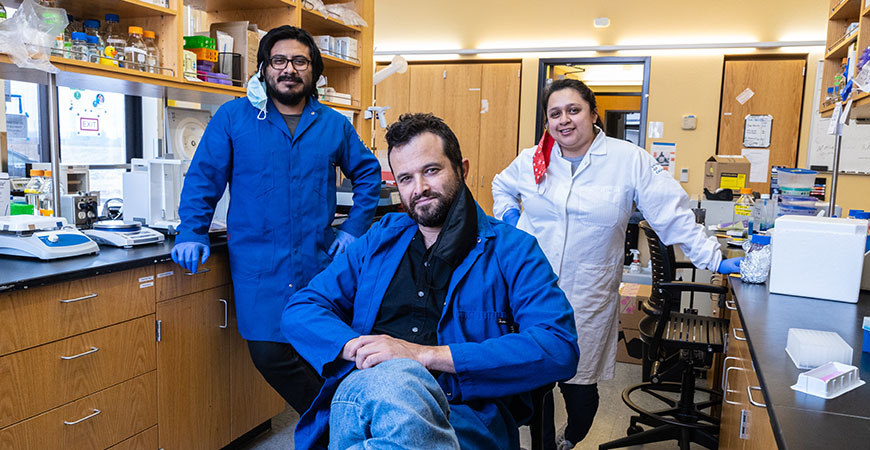
Like many people this summer, Professor Shahar Sukenik has dehydration on his mind.
But it’s not the soaring outside temperatures prompting this focus. Dehydration has been a theme of his lab’s work for the past year, from understanding how seeds know when to germinate to a new grant to further knowledge about the proteins that help protect cells and organisms against irreversible drying.
Sukenik’s lab specializes in the study of intrinsically disordered proteins — nanometer-sized machines that lack any kind of stable structure but still perform essential functions in all living cells. The lab previously received a $1.86 million grant from the National Institutes of Health (NIH) to study how these proteins function in health and disease.
The lab’s newest grant, from the National Science Foundation (NSF), offers $2.8 million to Sukenik and his collaborators at Washington University and the University of Wyoming to better understand how these “messy” proteins interact with their environment to provide protection from dehydration to organisms from all kingdoms of life. The grant is part of a new NSF initiative called Integrative Biology (IntBIO).
“Integrative biological research spans subdisciplines and incorporates cutting-edge methods, tools and concepts to produce groundbreaking biological discovery,” the NSF wrote. “The research should produce novel, holistic understanding of how biological systems function and interact across different scales of organization, e.g., from molecules to cells, tissues to organisms, species to ecosystems and the entire Earth.”
Sukenik, who’s in the Department of Chemistry and Biochemistry in the School of Natural Sciences and is a member of the Center for Cellular and Biomolecular Machines, said his lab and his collaborators plan to look at dehydration from the molecular level up to multi-celled organisms. Understanding how molecule behavior protects from dehydration will provide new strategies to help deal with ecosystems that are experiencing rapid changes in their climate.
Cells, tissues and organisms all contain a significant number of protein sequences that are intrinsically disordered and do not adopt stable three-dimensional structures. This special class of proteins is not yet well understood, but Sukenik’s lab will conduct experiments to try and discover how these disordered proteins provide protection from dehydration, the lab wrote in its grant proposal.
When such proteins are expressed in a large enough amount, everything in the cell slows down and the cell can recover from dehydration. Without them, dehydration is irreversible.
“The proteins seem to turn the cell’s environment into a self-protective one,” Sukenik said. He likened the phenomena to the vernal pools near campus. Each summer, they dry out and the organisms inside them, such as fairy shrimp, go dormant. But each spring, when the rains come, everything in the pools wakes up and begins a new life cycle. “We need to understand how the disordered proteins function in relation to dehydration.”
“We’re starting to use the biosensing disordered proteins to sense other things inside cells, as well,” Sukenik said.

Senior Writer and Public Information Representative
Office: (209) 228-4406
Mobile: (209) 201-6255